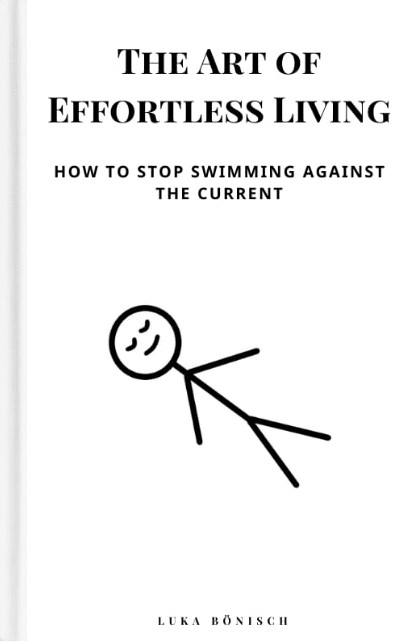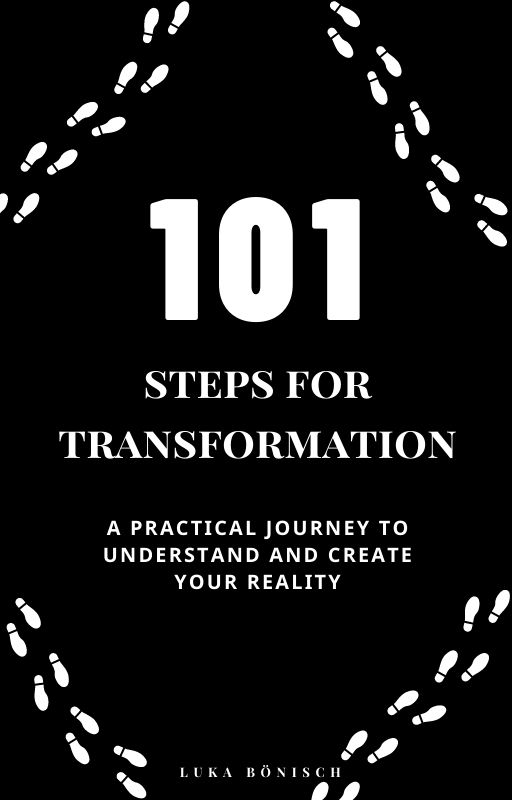Some time ago I was convinced that intentions are powerful and can help me ensure getting what I want. But this was usually a hit-or-miss kind of thing. Sometimes I felt setting an intention was the catalyst for a thing working out. And if it didn’t work out, well, blame my imperfect intention-setting abilities I guess.
But the more I started to question my fundamental beliefs and look for what I really am, the more my old ways of navigating life seemed clumsy.
Intentional living is popular these days. But intentional living is a synonym for putting a middleman between you and your experience. You and your experience, however, don’t need to be separated by a middleman because there is no experiential difference between you and your experience – what you are and what your experience is are the same thing.
Armed with this understanding, what sense does intentional living make?
On the other hand, unintentional living sounds more like something that is in alignment with this understanding. Unintentional living means no longer needing thoughts as the primary source for navigation through life.
But let’s not get too far ahead of ourselves.
It makes sense that intentional living is preached far and wide. We use it as the remedy to unconscious living — a life without awareness.
So, naturally, praising unintentional living sounds like I’m praising unconscious living. But that’s not the case. Unintentional living is not the stage before but after intentional living.
To make this clear, let’s move through the three stages and see how they manifest in our lives.
Unconscious Living

This stage is the life of a herd animal (no offense in case you feel offended).
Unconscious living means you are living a fully conditioned life. You are being pushed around by conditioned urges and don’t have the awareness to question anything seriously.
In this way of living you go about your daily activities and choices without thoughtfulness or awareness. It implies that you are acting on auto-pilot, driven by habit, social conditioning, and external influences rather than consciously considering your actions, values, and goals.
Another main aspect of unconscious living is that you don’t know you’re living unconsciously. If you are aware of your unconsciousness, you have at least gained enough awareness to question your herd animal life, which already elevates you above the common herd.
So simply by being here and reading this, it’s unlikely that you’re living a fully unconscious life. If you have stumbled in here by accident and are for the first time questioning your life’s validity, congratulations!
To celebrate, let’s look at some more characteristics that indicate an unconscious life:
1. Lack of self-awareness: You don’t reflect on/question your thoughts, emotions, or behaviors.
2. Routine and habit-driven: You follow routines and habits without questioning whether they align with your desires and values.
3. Reactivity: Unconscious living often involves reacting to external circumstances or other people’s expectations rather than making deliberate choices.
4. Conformity: You conform to societal norms and expectations without considering whether these align with your personal beliefs and goals.
5. Lack of mindfulness: Mindfulness involves being “present in the moment” and fully engaged in one’s experiences. Unconscious living often involves distraction and being mentally elsewhere.
6. Shallow/repetitive decision-making: You make decisions hastily based on past decisions, without consideration of the potential consequences or alternatives.
7. Emotional avoidance: Unconscious living involves suppressing or avoiding difficult emotions rather than addressing them honestly.
Of course, in itself, the above is not wrong or bad. One of the big steps is becoming aware of those characteristics in your own life. And by becoming aware, you’re no longer living an unconscious life.
If, after seeing all those unconscious habits in yourself, you decide that you want to keep engaging in those habits (unlikely), then more power to you. At least they’re no longer unconscious. An increase in awareness, however, will most likely lead to breaking most, if not all, of those habits.
Considering the points above, we can also see how evil and suffering are so widespread. If there is anything we can call the source of evil then unconscious living is a good contender.
Intentional Living

When I first realized that my current way of life — being pushed around by unconscious and otherwise conditioned urges — just doesn’t cut it, I decided that something needed to change. I wanted to live an aware and self-directed life.
Thus, with a lot of effort and discipline, I entered the next stage: Intentional living.
Intentional living means making conscious and deliberate choices about how you want to live and what you want to prioritize. It involves actively shaping your life based on personal values, goals, and principles, rather than simply reacting to external circumstances or following societal norms and expectations.
Our desire to live an intentional life is the lifeline of the personal/spiritual development/growth market. Anyone who has reached this stage (and it’s not too hard to reach) knows how many things one can do at this point.
You can…
…meditate, set goals, find your purpose, engage in spiritual practices, get clear on your values, repeat positive affirmations, visualize, manifest, practice gratitude, improve yourself, start a business, travel the world, be vegan, open chakras, go to retreats, eat salads, be the kindest human ever, love your enemies, consume psychedelic beverages and puke and shit yourself in front of a shaman, read one book a day, accept everything, follow your bliss, and so on and so forth.
Personally, I’ve done even more than I mentioned. And while it was nice as long as it lasted, I burned out on it.
I realized that all the stuff I did didn’t ensure the life I imagined, nor did it make me substantially happier. If anything, it made me more neurotic. It also cost me a lot of damn effort to keep doing the things that intentional people were doing.
Burning out on intentional living was the last step before shifting gears once more.
This doesn’t mean you have to burn out or get all obsessed about being a perfect human being. It’s not so much about what and how much of it you have done. It’s about understanding.
You must understand that the world can never satisfy the never-ending demands of the mind. Come to the point where you realize that true peace doesn’t come from treating your mind and body as slaves working toward an unattainable ideal.
When we seriously inquire into our selves and reality, sooner or later, we reach another stage of living.
Unintentional Living

Unintentional living is almost like unconscious living but inverse — the unconscious has become conscious and is thus the new conscious.
Another way to put it is that the unintentional life is the unconscious life + understanding.
At this stage, for example, there is most likely a lack of self-reflection. Contrary to the lack of self-reflection in the unconscious life, this doesn’t come from unawareness but from maximum awareness or understanding.
By understanding, I mean understanding what and where you really are.
So we can’t live a truly unintentional life as long as we hold on to the common beliefs about ourselves and the world. This is where questioning fundamental beliefs, inquiry, investigating your direct experience, and so on are useful.
At some point, you realize that you don’t need to premeditate future actions. There are none. All you’re engaging with is this moment, which doesn’t really make the immediacy of it all clear.
As much as you and your experience are the same thing, you and the moment are the same thing as well. So what we’re saying is you’re engaging with yourself.
This doesn’t mean that planning things or thinking about things is wrong and should be avoided. Personally, I like thinking. If that is what is indicated right now, it will happen. But you won’t do it from a sense of necessity or obligation.
To put it differently, your actions will no longer be fear-based.
Every thought, word, and action will happen spontaneously – which they already do anyway – without you (the middleman) feeling like you have to interfere or meddle with anything.
In other words, the unintentional life is always the case even when we’re in the stage of intentions. Another word for unintentional is spontaneous and no matter how unspontaneous your life feels, it’s all spontaneous.
We can talk about this mode of functioning as much as we like but if it’s not your experience, it might sound unrealistic. It certainly seems like the complexity of our modern lives demands a lot of overseeing and managerial activity.
But that simply isn’t the case.
The Game of Life

All this overseeing and managing is nothing but thinking about life, which is unnecessary for life to go on.
Sounds obvious. Sure, but the vast majority of us don’t live like it’s obvious. We live as if we’re primates on a planet with which we must bargain to get the slightest bit of blessings. That’s why we have to plan each step meticulously like in a chess game.
But life is not a game of chess. Life is like music. If you think too much about it, you fuck up.
You play life on the feel. You do that by starting to pay attention to what’s happening in and around you. And the more you get any trace of yourself out of the way, the clearer you will know when something is indicated.
You allow your body to move spontaneously. You recognize the slightest movements in the flow of life, of which you are an integrated part, and then move with it. And if necessary, you gently course correct.
By the way, I’m not saying it’s bad to have intentions or goals. What I’m saying is to recognize the inherent spontaneity of life.
Try this for yourself: The next time you decide to do something, don’t. Simply remain still wherever you are (even if you’re standing around like an idiot) and wait until action happens spontaneously (it will).
Instead of premeditating every action, allow some spontaneity. Allow your body to take the lead. You will see that things still keep going and in many ways even better. You’re not wasting precious energy on overthinking every little thing, and you still get from A to B.
The more you see this working out the more trust you have and the more you’ll shift into a direct way of living.
When you recognize this inherent spontaneity, you’ll want to align yourself with it simply because it’s natural.
This is when life becomes more effortless. Not because there won’t be any more effort but because the energy wasted on middleman activity is now reclaimed. Now it’s no longer you putting in the effort but it’s effortlessness putting in the effort.
But if you’re not a middleman then what are you?
That’s for each of us to figure out.
The good news is that recognizing your true identity, which is no identity, is not a hard thing to do. The hard part is abiding in your true identity, which, again, is no identity.
Similarly, acting unintentionally sometimes is not hard, the hard part is seeing everything that is trying to take you out of your natural way of functioning.
Luckily, both goals – true identity and unintentional living – are reached by the same path. And when you have had a first glimpse, all you need to get to continuous seeing is unwavering sincerity and willingness to never hide from yourself again.
Thus, unintentional living is simply fully exposed living. Or, in other words, fearless living.
Luka
Latest posts by Luka (see all)
- No Seeking No Path - April 29, 2025
- Stepping Out of Time - April 22, 2025
- Back to the Basic Point(ers) - April 8, 2025


